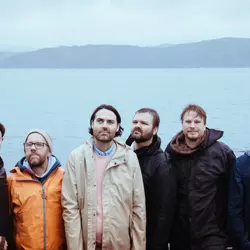 The Phoenix Foundation
The Phoenix FoundationEver ambitious Kiwi indie stalwarts The Phoenix Foundation have been concocting their idiosyncratic sonic playgrounds for nearly two decades now - forming in Wellington back in 1997 - but they're obviously still open to learning new tricks of their chosen trade. For recent sixth long-player Give Up Your Dreams the acclaimed outfit - who've been nominated for an astounding 24 New Zealand Music Awards over the journey, taking home six - could have easily stuck to their guns and given fans more of what they've enjoyed in the past, but instead they undertook a noticeable stylistic turn which is already paying handsome dividends.
"It came out great," smiles co-frontman Sam Scott of the album. "It was always going to be a challenging record I think because we wanted to shift our perspective and come up with songs from the rhythmic angle rather than the strummy acoustic guitar starting point where a lot of our songs start, and that definitely signalled a different approach right from day one. It was sometimes difficult but ultimately it was really rewarding and really fun to record once we were all working as a band.
"Let's try to not sound like Pavement on this one, let's try and sound like Ethiopian spiritual and religious tracks from the '70s or something."
"I think [the change] was probably because we had a new drummer [Chris O'Connor] - and he's really amazing - so the challenge became for us to come up with beats that he couldn't play I guess," Scott chuckles. "That proved impossible. It was mainly Luke [Buda] our other singer's directive that he wanted to make stuff that was really rhythmically complex and more direct than our previous records."
Scott elaborates that there were some more esoteric influences at play than their usual indie rock touchstones.
"We were trying to combine that whole krautrock thing with AfroBeat rhythms, so the inspirations were all of the obvious cool reference points that people try to bandy about these days," he tells. "I was listening to a lot of Ethiopiques kinda stuff over the last few years, and Conrad [Wedde] our lead guitarist always has some new genre he's found like Turkish psychedelic stuff - there's always some different element coming in from someone in the band. Everyone's got quite diverse tastes. It's fun trying to push yourself in different ways and go, 'Let's try to not sound like Pavement on this one, let's try and sound like Ethiopian spiritual and religious tracks from the '70s or something'. [Pavement] were definitely an influence on us early on though - I actually do completely love them."
Don't miss a beat with our FREE daily newsletter
Given that Pavement were themselves turned on by the earlier wave of New Zealand bands from the Flying Nun stable, the obvious question becomes whether The Phoenix Foundation also drink from that fertile local well?
"It is an obvious question but it's also a really relevant one, because we do - there are heaps of bands that we absolutely love from that time and that label," Scott admits. "I think you'd be a pretty cold-hearted New Zealand musician to not see the joy in The Clean or The Chills and the others, they're great bands."
"That's the trick, getting stuff that's quite complicated and making it sound easy and making it sound groovy."
Right now though Scott is particularly excited at how well the material from Give Up Your Dreams has translated into the live realm.
"I feel that what's really exciting is not whether or not it's our best album - that's up for time to debate - but at this point it seems pretty unquestionable that it's our best live record," he enthuses. "Taking this record on the road just feels really, really exciting so I think that the people who've got the record and are enjoying it will come to see the shows and will probably enjoy the record more after seeing it live. You really get to see how our rhythm section of Will [Ricketts] on percussion and Chris on drums and Tom [Callwood] on bass work together to make these quite bizarre rhythms, and make them sound not so weird. That's the trick, getting stuff that's quite complicated and making it sound easy and making it sound groovy so that you can have a good dance to it. Especially tracks like Myth are really interesting live - that has a really strange kind of pattern and strange accents, and once we get amongst that live it's a really transcendental effect, it really takes you away."
In Scott's opinion is The Phoenix Foundation's sound much different onstage than in the studio?
"I think it is," he reflects. "It's probably a bit heavier just because that's the inherent nature of playing live. On previous records we really focused on making really polished production music, but with this album we recorded most of it live and really focused on having really strong rhythmic performances, so even though it's a real studio record I do feel like this one live is weirder and closer to the album than our previous records. It's a much weirder thing to see live."















